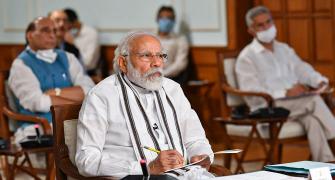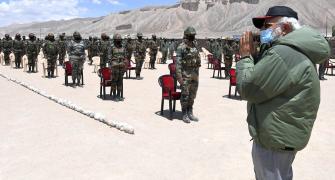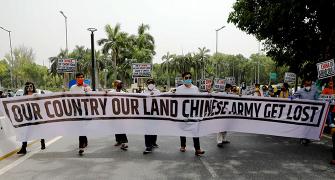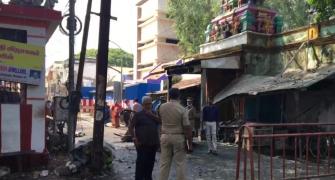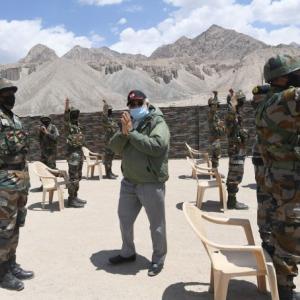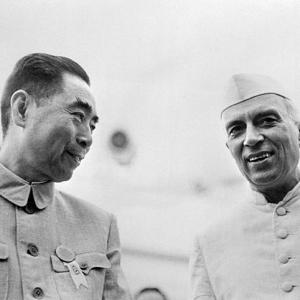'Like Nehru, too, Modi has found dealing with Beijing more and more difficult and has adopted an increasingly assertive approach towards managing India's northern neighbour.'

Ian Hall -- a professor at the School of Government and International Relations, and deputy director, Griffith Asia Institute, Griffith University, Brisbane, Australia -- is currently working on the evolution of Indian thinking about world politics since 1964.
"India is now forced to compete in the region with a much richer China, and that is a major challenge," Professor Hall, who has also written a book on the Narendra Damodardas Modi government's foreign policy, tells Aditi Phadnis.
Now that the dust has (somewhat) settled after the Galwan Valley clash between India and China, most observers say Narendra Modi's handling of the incident was not significantly different from Jawaharlal Nehru's. Do you agree?
In China's context, Nehru said he had ordered troops to vacate Thagla ridge. Modi has spoken generally about no Indian territory being compromised but stopped short of equivalence in a military response...
There are certainly more similarities between how Modi handles foreign and security policy and how Nehru did.
Like Nehru, Modi has made great use of the world stage to burnish his image as a respected world leader.
This gave him a distinct advantage at home, with the BJP arguing Modi's personal diplomacy boosted India's standing at the global stage.
Nehru, of course, acted in similar ways for similar reasons, spending much time addressing international issues like anti-colonialism and ending racial discrimination despite pressing problems at home.
When it comes to China, there are also commonalities in Nehru and Modi's approaches.
Like Nehru, Modi has tried to build a personal rapport with his Chinese counterparts, especially Xi Jinping.
Who can forget Modi and Xi sitting together on a gilded swing during the Chinese president's visit to Gujarat in September 2014?
But like Nehru, too, Modi has found dealing with Beijing more and more difficult and has adopted an increasingly assertive approach towards managing India’s northern neighbour.
Modi has openly criticised the Belt and Road Initiative, called out transgressions across the Line of Actual Control, and worked hard to deepen India's partnership with the US.
The Modi government has also accelerated the upgrade of strategic infrastructure along the LAC.
And this appears to be one of the reasons for incursions by Chinese troops this year, as Beijing sees some of these roads as threat to its control on Aksai Chin and territories beyond.
Those much-needed upgrades are not analogous, however, to Nehru's controversial 'Forward Policy' that precipitated the Chinese attack in October 1962.
There are, of course, some similarities between the Thagla incident, which led to the death of 25 Indian soldiers and slightly more Chinese troops, and the bloody clash in the Galwan Valley on June 15.
In both cases, Indian forces went across the LAC and met with a bloody Chinese response.
But the big difference is that the new positions in contention in the Galwan Valley were not assumed by India's soldiers, but by the People's Liberation Army.
It is Beijing that has adopted a 'Forward Policy' rather than India.
After his 2014 victory, Modi emphasised that a government having a strong parliamentary majority had made an appreciable difference in the way India was seen by the world. Foreign policy has never really been an element in domestic politics. Has this changed?
On the one hand, survey after survey shows they make their choices based on issues like economic growth, education, health, and infrastructure, in much the same way as voters do in any other democracy.
And that hasn't changed under Modi.
But on the other hand, India's voters also clearly respond positively to leaders they think are respected in the world -- to leaders who make them feel proud to be Indians.
They liked Nehru for this reason, and indeed Indira Gandhi.
This isn't unusual, but it does mean that it is advantageous for Indian leaders to be taken seriously by their counterparts, especially powerful ones, like the president of the US or China or Russia.
Internationally, there are also benefits to having a leader who is perceived abroad as dynamic and fully in control of his/her government.
India experienced these early in Modi's tenure, as foreign investment flowed into the country, driven as much by the boost in confidence he had generated as by reforms his government had enacted.
Of late, however, worries about the state of the economy and the government's desire for further reforms have crept in, and investment has dropped.
Concerns about some elements of Modi's agenda, concerning the citizenship law and Kashmir, for example, have also grown in some places.
Modi's outreach to the world has been characterised by personality projection -- his 'Abki baar Trump sarkar' assertion, public affection for 'my friend Bibi' (Israeli Prime Minister Binyamin Netanyahu), appreciation for (Japanese Prime Minister) Abe Shinzo.
But Hindu nationalism as a tenet has not been expounded as a foreign policy doctrine. Do you agree?
Yes, I would.
There have been talks of a distinctively Hindu nationalist doctrine -- of a Panchamrit, as (BJP General Secretary and former Rashtriya Swayamsevak Sangh spokesperson) Ram Madhav has put it, that might replace the Panchsheel.
Modi himself has referred to the ideas of Swami Vivekananda or Sri Aurobindo as intellectual inspirations not just for domestic policy, but foreign policy and the world.
His government has dropped any reference to non-alignment and to 'strategic autonomy' -- concepts closely associated with Nehru and with the Congress.
But a doctrine that draws inspiration from those figures and others in the Hindu nationalist tradition has yet been fully articulated.
Modi invested heavily in the Diaspora. Has the Diaspora managed to propel policy in their countries in India's favour?
There is really only one case that I know of in which the Indian Diaspora successfully organised and lobbied in India's favour, and that involved the India-US nuclear deal, under Manmohan Singh.
Under Modi, I think the Diaspora has been useful in other ways, in supplying both campaign funds for the BJP and know-how in social media and things like that.
But it has not been very active in trying to influence policy abroad.
Partly, I think, that is because it has not been needed.
The US is reasonably well disposed to India, despite Donald Trump's occasional complaints about trade imbalances and immigration.
Also, Diaspora lobbies must walk a very fine line or else they might appear disloyal to their country. And they must be very organised and motivated.
Under Modi, parts of the Diaspora have been quite motivated -- we have seen that in London, Houston, and Singapore.
But they are not as well organised or funded as they need to be to have a big impact on policy in places like Washington.
How do you evaluate 'Neighbourhood First'?
I think, it has been a mixed bag.
Outreach to the region via SAARC (the South Asia Association for Regional Cooperation) has obviously foundered on the deterioration of the India-Pakistan relationship, which has left that organisation inoperable.
New Delhi has got around this obstacle by using mechanisms like BIMSTEC, which has worked better.
But the Modi government has also made mistakes and the circumstances in which it has worked have got steadily worse.
The biggest error was allowing the blockade of Nepal to drag on in 2015, which squandered whatever diplomatic capital Modi had accumulated in his first year in office.
But over India's relations with Nepal, as with every other sState in South Asia and the Indian Ocean, China looms and has made things very difficult.
Smaller States in the region can now play India off against China to their advantage.
Sometimes, as the case with Nepal, they can also miscalculate and end up much more influenced by Beijing than they may want.
In any case, India is now forced to compete in the region with a much richer China, and that is a major challenge, undercutting 'Neighbourhood First'.
A defining feature of Modi's foreign policy has been allowing armed forces to cross the Line of Control. Would you say this is the edifice of a Hindu nationalist foreign policy?
The 'surgical strikes' in 2016 and the Balakot air attack in 2019 have certainly defined the Modi government, that's true.
The idea of a muscular India has long been popular within the Hindu nationalist movement, running back to V D Savarkar and M S Golwalkar in the mid-20th century.
But the big problem faced by the Modi government is that establishing deterrence against terrorist attacks like we saw at Pulwama is extremely difficult, and there are worrying signs this year of another upsurge in infiltrations.
The problem cannot be solved by cross-LoC raids; it will eventually need a diplomatic solution.


